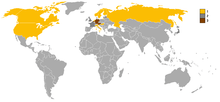World Allround Speed Skating Championships for Men
The International Skating Union has organised the World Allround Speed Skating Championships for Men since 1893. Unofficial Championships were held in the years 1889–1892. [1]
History

Medal winning countries at the World All-Round Speed Skating Championships.
Distances used
- In 1889, three distances had to be skated: 1/2 mile (805 m) – 1 mile (1,609 m) – 2 miles (3,219 m).
- In the years 1890-1892, four distances had to be skated: 1/2 mile (805 m) – 1 mile (1,609 m) – 2 miles (3,219 m) – 5 miles (8,047 m).
- Since 1893, four distances have to be skated: 500 m – 1,500 m – 5,000 m – 10,000 m (the big combination).
Ranking systems used
- In 1889, one could only win the World Championships by winning all three distances. If no one won all three distances, no winner would be declared. Silver and bronze medals were not awarded.
- In the years 1890-1907, one could only win the World Championships by winning at least three of the four distances, so there would be no World Champion if no skater won at least three distances. Silver and bronze medals were never awarded.
- In the years 1908-1925, ranking points were awarded (1 point for 1st place, 2 points for 2nd place, and so on); the final ranking was then decided by ordering the skaters by lowest point totals. The rule that a skater winning at least three distances was automatically World Champion was still in effect, though, so the ranking could be affected by that. Silver and bronze medals were awarded now as well.
- In the years 1926-1927, the ranking points on each distance were percentage points, calculated from a skater's time and the current world record time. Apart from that, the system used was the same as in the immediately preceding years.
- Since 1928, the samalog system has been in use. However, the rule that a skater winning at least three distances was automatically World Champion remained in effect until (and including) 1986. It was abolished as a result of three-distance-winner (and thus World Champion) Rolf Falk-Larssen having a worse samalog score than silver medal winner Tomas Gustafson in 1983.
Records
- Sven Kramer has won a total of 8 world championships, in 2007, 2008, 2009, 2010, 2012, 2013, 2015 and 2016.
- Clas Thunberg, Oscar Mathisen have each won a total of 5 world championship. Mathisen took gold in 1908, 1909, 1912, 1913 and 1914, Thunberg in 1923, 1925, 1928, 1929 and 1931.
- Sven Kramer has won 4 consecutive world championships, taking gold in a row in 2007, 2008, 2009 and 2010.
Medal winners
Unofficial championships
| Year | Location | Gold | Silver | Bronze |
| 1889 | Amsterdam | None declared | None declared | None declared |
| 1890 | Amsterdam | None declared | None declared | None declared |
| 1891 | Amsterdam | | None declared | None declared |
| 1892 | Amsterdam | Cancelled due to ice conditions | ||
| 1940 | Oslo | | | |
| 1946 | Oslo | | | |
Official championships
All-time medal count
- Only official tournaments are taken into account
| rank | country | Gold | Silver | Bronze | total |
| 1 | | 36 | 32 | 31 | 99 |
| 2 | | 36 | 17 | 27 | 80 |
| 3 | | 9 | 10 | 3 | 22 |
| 4 | | 8 | 13 | 10 | 31 |
| 5 | | 7 | 5 | 5 | 17 |
| 6 | | 3 | 5 | 2 | 10 |
| 7 | | 3 | 3 | 6 | 12 |
| 8 | | 1 | 3 | 3 | 7 |
| 9 | | 1 | 0 | 0 | 1 |
| | 1 | 0 | 0 | 1 | |
| 11 | | 0 | 2 | 1 | 3 |
| 12 | | 0 | 1 | 2 | 3 |
| 13 | | 0 | 1 | 1 | 2 |
| 14 | | 0 | 1 | 0 | 1 |
| | 0 | 1 | 0 | 1 | |
| | 0 | 1 | 0 | 1 | |
| 17 | | 0 | 0 | 2 | 2 |
| 18 | | 0 | 0 | 1 | 1 |
| - | independent | 0 | 0 | 1 | 1 |
| - | none declared | 5 | 15 | 15 | 35 |
See also
Notes
- ↑ Wathén represented the Grand Duchy of Finland which was part of the Russian Empire at that time.
- ↑ Strömsten represented the Grand Duchy of Finland which was part of the Russian Empire at that time.
- ↑ Wickstrøm represented the Grand Duchy of Finland which was part of the Russian Empire at that time.
- ↑ Pajor used to skate for Hungary until he defected in 1949. From then on the ISU allowed him to participate as an independent skater representing the ISU as he did in 1951. In 1952 he represented Sweden at the European Allround Championships in Östersund in Sweden winning the bronze medal in the overall standings.
- ↑ Until 1995 Veldkamp skated for the Netherlands. From 1996 he skated for Belgium in order to avoid having to participate in Dutch qualification trials for the major tournaments.
References
- ↑ "Some Key Dates in ISU History". ISU.org. Retrieved 21 November 2012.
This article is issued from Wikipedia - version of the 5/14/2016. The text is available under the Creative Commons Attribution/Share Alike but additional terms may apply for the media files.